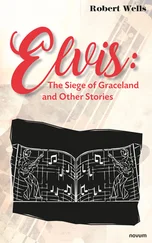Robert Walser - A Schoolboy's Diary and Other Stories
Здесь есть возможность читать онлайн «Robert Walser - A Schoolboy's Diary and Other Stories» весь текст электронной книги совершенно бесплатно (целиком полную версию без сокращений). В некоторых случаях можно слушать аудио, скачать через торрент в формате fb2 и присутствует краткое содержание. Город: New York, Год выпуска: 2013, ISBN: 2013, Издательство: NYRB Classics, Жанр: Классическая проза, на английском языке. Описание произведения, (предисловие) а так же отзывы посетителей доступны на портале библиотеки ЛибКат.
- Название:A Schoolboy's Diary and Other Stories
- Автор:
- Издательство:NYRB Classics
- Жанр:
- Год:2013
- Город:New York
- ISBN:978-1590176726
- Рейтинг книги:5 / 5. Голосов: 1
-
Избранное:Добавить в избранное
- Отзывы:
-
Ваша оценка:
- 100
- 1
- 2
- 3
- 4
- 5
A Schoolboy's Diary and Other Stories: краткое содержание, описание и аннотация
Предлагаем к чтению аннотацию, описание, краткое содержание или предисловие (зависит от того, что написал сам автор книги «A Schoolboy's Diary and Other Stories»). Если вы не нашли необходимую информацию о книге — напишите в комментариях, мы постараемся отыскать её.
A Schoolboy's Diary and Other Stories — читать онлайн бесплатно полную книгу (весь текст) целиком
Ниже представлен текст книги, разбитый по страницам. Система сохранения места последней прочитанной страницы, позволяет с удобством читать онлайн бесплатно книгу «A Schoolboy's Diary and Other Stories», без необходимости каждый раз заново искать на чём Вы остановились. Поставьте закладку, и сможете в любой момент перейти на страницу, на которой закончили чтение.
Интервал:
Закладка:

“Fritz Kocher’s Grave”
1904
PART II
GREIFEN LAKE
IT IS A crisp, clear morning and I set out to hike from the big city and its big famous lake to a small, almost unknown lake. Along the way, I encounter nothing but everything an ordinary person can encounter on his ordinary way. I say “Good day” to a couple of hard-working reapers, that’s all; I attentively observe the dear flowers, that’s all too; I start a friendly chat with myself, that is once again all. I do not pay attention to any special features of the landscape, because I’m walking and I think that there is nothing special for me here anymore. And so I walk, and in so walking I have already passed the first village, with the big wide houses, with the parks inviting the walker to rest and forget, with the splashing fountains, the beautiful trees, courtyards, shops, and other things I don’t at the forgetful moment happen to remember. I keep walking and only start paying attention again when the lake shimmers forth over the green foliage and quiet tips of the fir trees; I think: That is my lake, which I have to walk to, which draws me to it. The way in which and reason why it draws me to it are things the gentle reader will soon know himself should he have any interest in continuing to follow my description, which will now take the liberty of bypassing paths, meadows, forest, forest stream, and field and leap all the way to the little lake itself, where it will stop along with me and be unable to marvel enough at the unexpected, only secretly suspected beauty of said lake. Let us now let it speak for itself in all its traditional volubility: It is a broad, white silence, edged with green, airy silence; it is lake and surrounding forest; it is sky, and so light-blue, so half-sad a sky; it is water, and so sky-like is the water that it could just as well be the sky and the sky the blue water; it is sweet blue warm silence and morning; it is a beautiful, beautiful morning. I cannot find the words for it, although I have put forth far too many words already, it seems to me. I do not know what to describe because all of it is so beautiful, so simply there for sheer beauty’s sake. The sun shines down from the sky onto the lake which becomes completely like a sun with the sleepy shadows of the life all around it quietly rocking back and forth within it. There is nothing to disturb the scene, everything is lovely in the sharpest closeness, in the haziest distance; all the colors in the world play together and are a single charmed and charming world of morning. The high Appenzeller mountains rise up modestly in the distance, no cold wrong note, no, only a high, distant, blurry green, part of the green that is so splendid, so soft, in the whole vicinity. Oh, how soft, how still, how pristine this vicinity is, and consequently how still, soft, and pristine is this little, practically unnamed lake. — This description of mine, an enthusiastic, enraptured description, really does talk like that. And what should I add? If I had to start over again I would talk the same way it does, for this description is utterly what my heart has to say. On the whole lake I see only a single duck, swimming back and forth. I quickly pull off my clothes and do as the duck does: I swim far out into the lake, with the greatest delight, until my breast has to work hard, my arms are tired, and my legs are sore. What a pleasure it is to tire oneself out with pure delight! The sky that has already been described, described with far too little heartfeltness, is above me and a sweet, silent depth is beneath me; and with anxious, apprehensive breast, I work my way across the depth back to land, where I shiver and laugh and cannot breathe, almost cannot breathe. The old Greifensee Castle says hello from across the lake, but I have absolutely no interest in historical recollections at the moment; rather, I look forward to spending an evening or night here at this very place, and I go over and over in my mind what it will be like on this little lake when the last light of day hovers over its surface, or how it will be when the countless stars hover overhead — and I swim out again.—
July 1899; 1914
SIX LITTLE STORIES
A POET is bent over his poems, of which he has assembled twenty. He turns one page after another and finds that every poem awakens a very particular feeling inside him. He racks and racks his brain to try to figure out what kind of something it is hovering over or around his poeticizings. He presses hard but nothing comes out, he strikes with the ball of his hand but nothing comes out, he pulls but everything stays exactly as it is, namely shrouded in darkness. He lays his head down on his crossed arms and completely covers the open book with his body and cries. I, on the other hand, the wag of a writer, am bent over his work and can solve with infinite ease the riddle of his volume. Very simply, it contains twenty poems, one of which is simple, one pompous, one enchanting, one boring, one moving, one divine, one childish, one very bad, one animalistic, one awkward, one impermissible, one incomprehensible, one repulsive, one charming, one reticent, one magnificent, one tasteful, one worthless, one poor, one unspeakable, and one more cannot be because there are only twenty different poems, each of which has received from my lips perhaps not exactly a just but at least a quick judgment, which always takes the least trouble on my part. One thing is certain, though: The poet who wrote them is still crying, bent over the book; the sun is shining over him; and my laughter is the wind that violently, coldly musses his hair.
I play upon the lute of memory. It is a minor instrument, which always only makes one and the same sound. This sound is sometimes long, sometimes short, sometimes sluggish, sometimes quick. It breathes calm breaths, or else it surpasses itself in a hasty leap. It is sad and merry. The strange thing is that when it sounds melancholy it makes me laugh, that when it is merry and leaping I cannot keep from crying. Has there ever been a sound like it? Has music ever been played on such a wondrous instrument? It is almost impossible to pick it up, this instrument: Hands, even the softest and most slender of build, are too rough for it. It has unspeakably thin, delicate strings. Hairs are halters in comparison. There is a young man who knows how to play it, and I, who have time to settle down and wait, listen to him. He plays day and night, without thought of food or drink, late into the night and the day. From day to night and from night to day again. Time must exist for him only so that he can let it waft past him like a melody. The same way I listen to him, the lute player, he, the lute player, spends the whole time listening to his beloved, i.e., the sound of his instrument. Never has a lover listened and lain in wait so faithfully, so steadfastly. How sweet it is to listen to a listener, to watch a lover, to feel a forgotten one at one’s side. The young man is an artist, memory his instrument, night his space, dream his time, and the melodies he gives to life are his faithful servants who speak of him into the greedy ears of the world. I am only an ear, an unutterably moved ear.
There is a boy, I don’t know his name, who is lucky enough to enjoy lessons on the grand piano from a very beautiful and regal piano teacher. Right at this moment he is being instructed in agility on the keys by the most beautiful hands on earth. The lady’s hands glide across the keys like white swans on dark water. They already say very gracefully what later lips will repeat. The boy is wreathed in absent-mindedness, which the teacher does not seem to want to notice. “Play that”—but he plays it indescribably badly. “Play it again”—but he plays it even worse than before. Well, he needs to play it yet again — but he plays badly. “You’re lazy.” He cries, he to whom this is said. She smiles, she who says it. He lays his head down on the piano, he who has to accept this being said of him. She strokes his soft brown hair, she who has had no choice but to say it. Now the boy, awakened from his shame by the soft caress, kisses the loving hand, which is very elegant and white. Now the lady throws her splendid arms, which are very soft and just the right tongs for a hug, around the boy’s neck. Now the lady lets herself kiss him and now the lips of the dear boy succumb to a kiss from the friendly lady. Now the knees of the kissee have nothing more urgent to do than sink down like falling blades of grass, and the arms of the kneeler nothing simpler to do than clasp the respective knees of the lady. The lady’s knees likewise waver, and now both of them, beautiful gracious lady and ordinary poor young man, are a single embrace, a kiss, a tumbling to the floor, a teardrop — and something else, too: an unexpected nasty surprise for someone who at this very moment opens the doors of the room, thereby bringing the sweetness of the love both have now forgotten, and also the story thereof, to an end.
Читать дальшеИнтервал:
Закладка:
Похожие книги на «A Schoolboy's Diary and Other Stories»
Представляем Вашему вниманию похожие книги на «A Schoolboy's Diary and Other Stories» списком для выбора. Мы отобрали схожую по названию и смыслу литературу в надежде предоставить читателям больше вариантов отыскать новые, интересные, ещё непрочитанные произведения.
Обсуждение, отзывы о книге «A Schoolboy's Diary and Other Stories» и просто собственные мнения читателей. Оставьте ваши комментарии, напишите, что Вы думаете о произведении, его смысле или главных героях. Укажите что конкретно понравилось, а что нет, и почему Вы так считаете.











